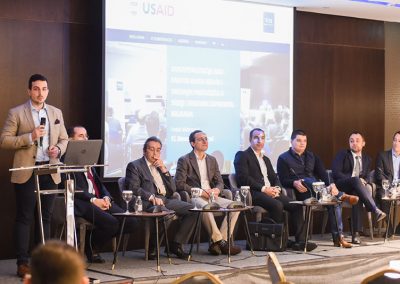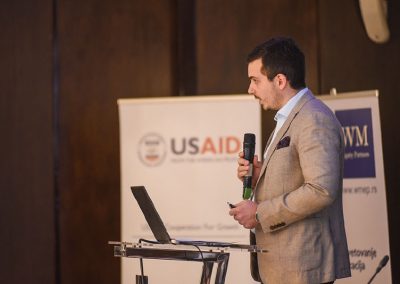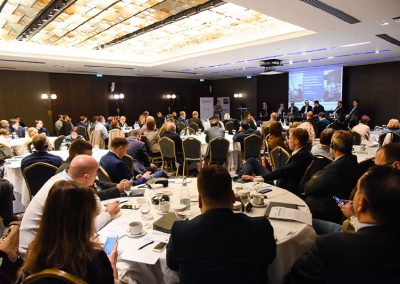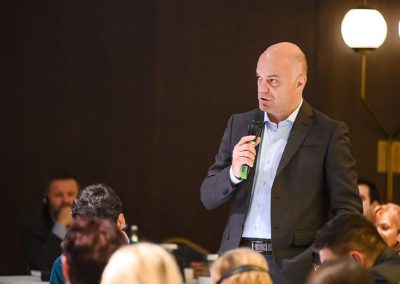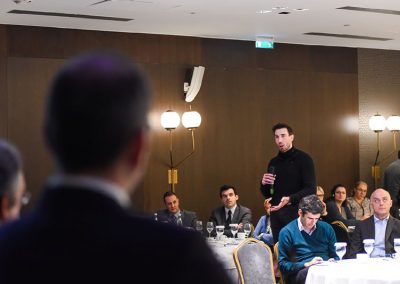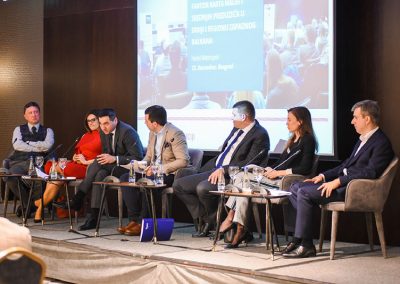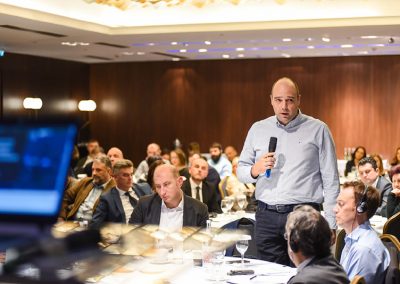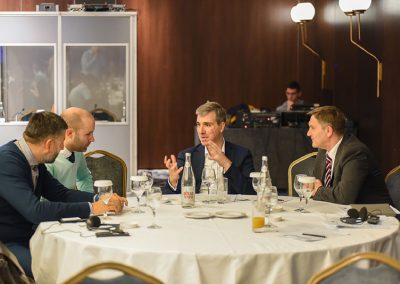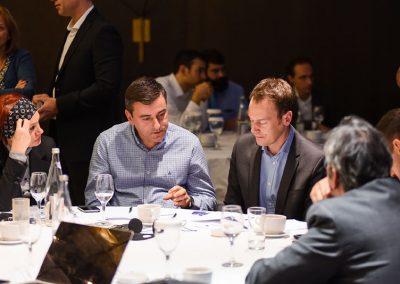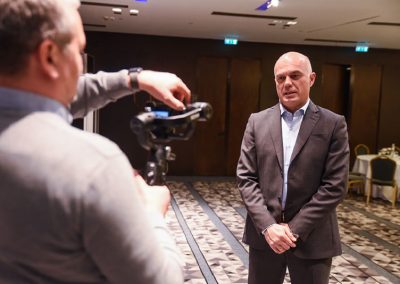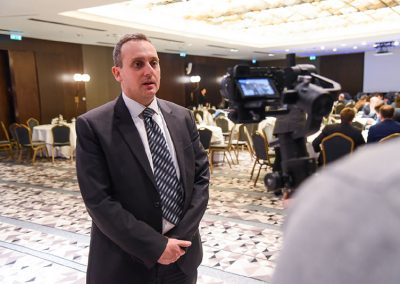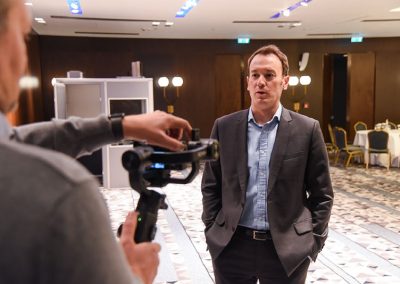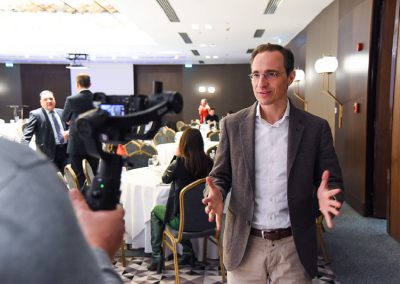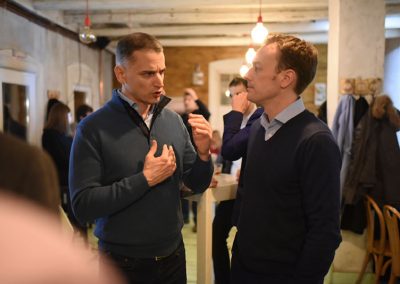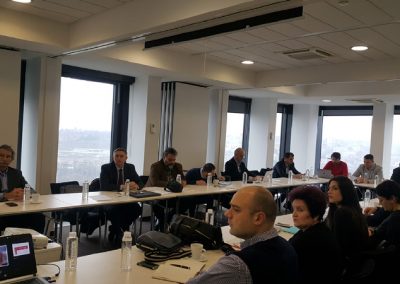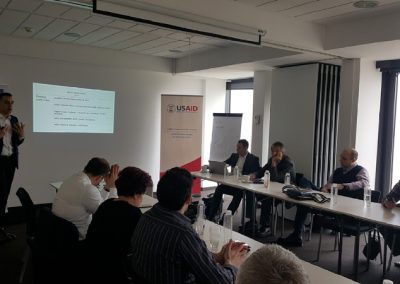EQUITY FINANCING AS A GROWTH FACTOR FOR SME’S IN SERBIA AND THE WESTERN BALKAN REGION
Hotel Metropol
December 12th, Belgrade
About conference
This one-day conference and workshop aims to present equity based financing to local SMEs as a competitive source of their financing and growth. This conference will bring together over 50 small and medium size enterprises, operating in different export oriented industrial sectors, as well as representatives of regional financial institutions, primarily equity funds, interested in investing in this region. This conference is an excellent opportunity to meet new partners and exchange relevant experience, expertise and information. SMEs representatives will have the opportunity to present their companies and find a new professional equity partner.
FACTS
Serbian economy consists of over 10,000 active small and medium enterprises, employing over 500,000 employees. These companies compose over 50% of the whole local economy, measured by the number of employees and by operating income generated during 2016 and 2017. Financial position of small and medium-sized enterprises is constantly improving and there is a positive trend in terms of revenue growth and profitability and hence their capacity for attracting professional equity investors able to empower their future business growth.
ISSUE
Despite their importance for the overall local economy, SMEs are facing a huge gap between their financing needs and available supply of external financing. Considering that, it is necessary for them to have detailed information about all available sources of financing, especially about equity-based financing, and to be prepared for attracting such financing sources.
GOAL
This free one-day conference aims to present equity-based financing to local SMEs, and to provide opportunity for them to meet representatives of regional investment funds and opportunities for financing their further growth.
Conclusions
With the support of the USAID Cooperation for growth project, on 12.12.2018 in the Metropol Hotel in Belgrade, WM Equity Partners successfully gathered over 70 representatives of SMEs in Serbia, as well as a significant number of representatives of the banking sector, university representatives etc. Entire event brought together nearly 150 participants and 14 speakers on SMEs equity financing in Serbia and the Western Balkan region.
The objective of this one-day conference was to present financing to small and medium-sized enterprises in Serbia through additional equity capital, as well as to give them the opportunity to meet regional representatives of investment funds and the possibilities for financing further growth of their business.
The process of organizing the conference included four commercial banks that recognized this initiative as an opportunity to support their clients, who with additional equity capital would additionally raise their level of business and borrowing capacity. Additional equity is identified as a complementary rather than a competitive source of financing to traditional banking products.
The conference was organized through two panel discussions and focus groups, during which representatives of small and medium-sized enterprises in direct contact with financiers could discuss their perspectives for obtaining additional capital.
Serbian economy consists of over 10,000 active small and medium enterprises, employing over 500,000 workers. These companies employ almost 50% of all employees in Serbia and with the same amount participate in the creation of total economic revenues in the territory of Serbia. Over the past five years, their financial position has been continually improving and there is a positive trend in terms of revenue growth and profitability, and thus the capacity for their financing. However, despite its importance for the overall domestic economy, small and medium-sized enterprises in Serbia continue to face a sizable gap between their financing needs and available external sources of financing.
First panel
Within the first panel, representatives of international financial institutions (EBRD and DEG), representatives of investment funds from Poland (CVI) and Bulgaria (PostScriptum), as well as representatives of local SMEs that had experience with investment funds (BeotelNET and CityExpert), presented their vision of business development through additional equity capital in the Western Balkans region.
The key conclusion of the first panel is that Serbia needs to build a complete financial system with smaller but locally operating Private Equity and Venture Capital funds, having in mind that large international funds mostly seek greater investment opportunities, thus leaving the largest number of domestic SMEs unavailable to this source of financing.
Panelists pointed out that investment funds are partners to SMEs sharing their risks, actively participating in their business development, and because of this, they expect a return that is higher than the interest rates charged by banks.
It was also noted that Bulgaria has made tremendous progress over the past six years in terms of supporting their local SMEs through equity financing, and Sofia was recognized on the Forbes list as one of the Top 10 destinations in Europe to open up the company. Serbia has the same opportunity, so panelists pointed out that they believe that Serbia will use its opportunity in the coming period.
Finally, representatives of SMEs pointed out that, with the support of the funds invested in them, they are working on regional expansion and opening their representative offices in Slovenia and Bulgaria.
Second panel
The second panel brought together representatives of SEAF and Blue Sea Capital investment funds, representatives of UniCredit Bank, Eurobank and Mirabank, as well as local company GOMEX, which has received equity investment from SEAF investment fund nearly 10 years ago, which afterwards, with its active participation in management, significantly influenced growth and development of the company itself.
During the panel discussion, the participants had the opportunity to hear the results SEAF and Blue Sea Capital realized in Serbia and the region, as well as the basic steps in identifying and evaluating potential investments. The vision of business development was noted as one of the key factors in the presentation and negotiations with potential investors.
Participants also had the opportunity to hear from representatives of the investment funds SEAF and Blue Sea Capital, as well as GOMEX, the added value that investment funds bring into every day business operations of their portfolio companies. In addition to the investment itself, organizing the corporate structure, adequate control and planning mechanisms, supporting the expansion of the market and adopting new technologies are just some of the components that have contributed to the intensive expansion and business success.
During the conference, the attendees filled out a short survey of their position on the availability of alternative sources of financing in Serbia, experiences with working with professional investors, as well as the usefulness of topics discussed at the conference in their everyday business.
Here are results:
Did you have experience Venture Capital and Private Equity funds:
Yes
No
Do you think that SMEs in Serbia are sufficiently familiar with investment funds as sources of financing:
Yes
No
On the scale (I-low, IV-high), evaluate the current availability of capital of investment funds when it comes to funding sources for SMEs in Serbia:
I
II
III
IV
On a scale (I-bad, IV-excellent), how would you evaluate organization of the conference:
I
II
III
IV
On the scale (I-bad, IV-high), how would you assess the actuality of the discussed topics:
I
II
III
IV
Have you gained some new knowledge during the conference that you think will be useful to you for further business:
YES
NO
Which parts of the conference were more resourceful to you in terms of acquiring new knowledge?
Panel 1.
Panel 2.
Diskusija kroz fokus grupe
Do you think that similar events should be organized more often:
YES
NO
Agenda
09:00 – 09:15 REGISTRATION OF PARTICIPANTS
09:15 – 09:30 INTRODUCTORY SPEECH
Karen Westergaard, Chief of party, USAID Cooperation for Growth Project
09:30 –10:30 SMEs SOURCES OF FINANCING IN SERBIA AND THE WESTERN BALKANS REGION
Moderator
Vladimir Pavlović, PhD, CFA WM Equity Partners
Panelists
- Attila Toth – Representative of the European Bank for Reconstruction and Development (EBRD)
- Representative of the European Investment Bank/European Investment Fund (EIB) tbc
- Marko Čučak – Representative of the German Investment Corporation (DEG)
- Evgeny Angelov – President of the Bulgarian PA and VC Association (BVCA) and representative of VC Investment Fund Postscriptum Ventures, Bulgaria
- Emmanuel Daull – Investment Director, CVI Dom Maklerski, Poland
- Salvator Levis – BeotelNet ISP, Belgrade, Serbia
Main topics
- Current trends of SMEs business operations and financing in the EU
- Currently available and the most common financing sources for SMEs in EU vs Serbia and the Western Balkans region
- How much diversified structure of financing affects the competitiveness of local economy?
- What are the most common barriers for the financiers in the region?
- Is there room for improvement, on both supply and demand side of equity-based financing in Serbia and the Western Balkan Region?
10:30 – 10.45 COFFEE BREAK
10.45 – 11:45 CAPITAL INCREASE AS SOURCE OF FINANCING
Moderator
Miloš Savić, CFA, WM Equity Partners
Panelists
- Lorena Macura – Vice President, SEAF Serbia Impact Fund/SEAF South Balkan Fund B.V.
- Vuk Vukovic – Partner at Blue Sea Capital
- Milic Cavic – Head of SME Department, SME Department Corporate Banking Division, Eurobank
- Željko Kišić – Head of Mid-Market Corporate Department, UniCredit Bank
- Jelena Milenkovic Robinson, Senior investment banker, Mirabank
- Goran Kovacevic – CEO of GOMEX, Zrenjanin, Serbia
Main topics
- Equity-based financing as a source of business growth, current trends in Serbia and the Western Balkan Region
- Equity-based financing vs other financing sources. Is there a room for competition or these sources have complementary dimension?
- Main challenges in implementing equity-based transaction in Serbia and the Western Balkan Region
- Main benefits from the perspective of the initial owner of SMEs equity, investment fund, creditors and public.
11:45 – 13:45 FOCUS GROUPS
Moderators
Vladimir Pavlović, PhD, CFA, WM Equity Partners
Miloš Savić, CFA, WM Equity Partners
Vladimir Drašković, CFA, WM Equity Partners
Milan Marinkovic, WM Equity Partners
Nikola Vukotić, WM Equity Partners
Main topics
- SMEs business model analysis including ESCG dimensions of business operations
- Identifying key competitive advantages and threats on the market
- Structure of current funding sources
- Identifying key business development aspects and required investments
13:45 – 14:00 FINAL CONCLUSIONS
14:00 – 15:00 LUNCH AND NETWORKING
Three day training sessions
These free three-day workshops are a continuation of a one-day seminar that was held on 12.12.2018. in Belgrade on the topic of equity financing of small and medium size enterprises (SMEs) in Serbia.
On these three-day workshops, training of selected SMEs is carried out on the topic of developing a business and investment plan, financial analysis, equity valuation, improvement of corporate governance practices and basic investment fund principles and other professional investors and financiers.
The aim of these workshops is to raise the level of knowledge and information of selected SMEs on the subject and their further development through additional equity capital of investment funds and other professional investors, and to prepare these companies for negotiations with these potential financiers.
Contact
Please feel free to contact us if you need any further information.
WM Equity Partners doo Beograd, Srbija
For all information regarding this conference, please visit our website at www.wmep.rs
Supported by: ![]()
Disclaimer: The author’s views expressed on in this publication do not necessarily reflect the views of the United States Agency for International Development or the United States Government.


